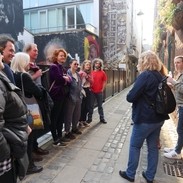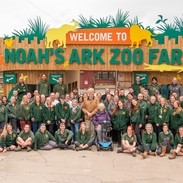Section 4: An inclusive welcome
Photo by: VisitBritain/Getty Images

Top Tips
The key to providing an inclusive welcome is communicating inclusively with your customers and colleagues, and offering opportunities to access information equitably.
Engaging with customers who have accessibility requirements does not have to induce the ‘fear factor’. This section includes hints and tips for both written and face-to-face communication.
If you’re ever in doubt, listen and learn. We’re all on this journey together and being open to education and improvement is key.
Something to consider
A moment for reflection
Before starting to read this section, think about what your business currently does to provide an inclusive welcome to all customers, and particularly those with accessibility requirements.
Providing an inclusive welcome
Ensuring your customers feel welcome, valued and have a great experience does relate partly to the design of the built environment and your digital accessibility (both of which we will come to later on in this toolkit). Ultimately, though, an inclusive welcome can be made or broken by one thing: communication. In this section, you’ll learn hints and tips relating to all communication methods and forms to help build your confidence around interacting with your customers who have accessibility requirements.
Communicating well, being kind and offering proactive assistance may be things that sound so obvious and are integral to running a successful business in general, regardless of whether customers have accessibility requirements or not. However, an inclusive welcome can be particularly important to disabled customers in terms of safety as 11,224 disability hate crimes were reported in England and Wales in 2022 (Leonard Cheshire). Knowing what to expect in terms of accessibility and being able to book with confidence can also have a hugely positive financial impact as, on average, disabled people face extra costs of £583 each month as shown in Scope’s Disability Price Tag findings in 2019.
Case study 1
The Deep
Staff training in disability awareness to support the provision of excellent customer service continues to be a focus for The Deep, an aquatic conservation centre in Hull.
“The Deep is proud of how its Crew embraces accessibility every day through a great welcome, a caring approach and good communication. This, combined with investment in the building (such as a Changing Places Facility) and the natural integration of accessibility within exhibition development, results in a memorable, successful visitor experience. Events such as adapted sleepovers, Tranquil Tuesdays and Quiet Days have proved hugely successful and further scope exists.”
This approach has resulted in positive feedback from guests that means a lot to the team. One visiting teacher shared their experience, “…The children had an amazing time, and every member of staff we came into contact with couldn’t have been more helpful… We all agreed it was the best trip we have ever been on with the class and a particularly super special trip for our pupil who was visiting on a bed.”
Staff guides have also received additional Sighted Guide Training from Guide Dogs UK, empowering them to provide personal space and independence to the person that they are supporting.
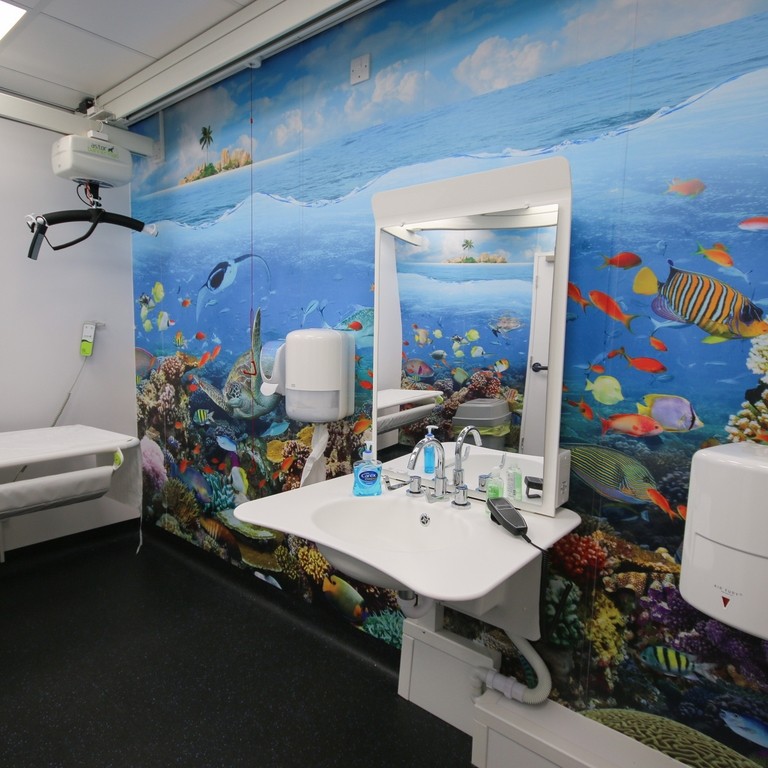
Inclusive communication hints and tips
Regardless of how much experience you have communicating with customers who have accessibility requirements, it’s natural to be a bit concerned about coming across as patronising or using the incorrect terminology every now and again. In fact, in a survey conducted by disability charity Scope, more than two thirds of people said that they felt uncomfortable around disabled people. Below are some hints and tips to change that and make your online and offline communication more inclusive.
Tip
Inclusive communication top tip
The trick is to always be willing to adapt and learn; those with accessibility requirements will always be experts in their own lived experience. So, where possible, take the time to listen to people’s personal preferences around language and communication, and follow their lead. And, if ever you’re unsure of how to refer to someone, or how to best support them – ask.
Case study 2
Chichester Festival Theatre (CFT)
“Chichester Festival Theatre’s (CFT Buddies) is a free companion service for anyone not comfortable attending the theatre on their own or needing extra support. During lockdown, people who had previously used the scheme or members of community groups helping those at risk of isolation were offered a weekly phone call from a Buddy.
“The remit has since expanded through a growing connection with Chichester District Council’s Social Prescribing Team. If someone goes to the GP presenting symptoms that are better addressed creatively than medically, for example, loneliness, the GP may refer them to the Social Prescribing Team who have a network of community and well-being groups to support individuals. In addition to coming to see a show or getting a phone call, individuals can now be referred to CFT Buddies for a monthly visit over tea or coffee, supporting social interaction. Buddies also now support people attending activities at another organisations or community centres anywhere across the district, on top of events at our theatre.”
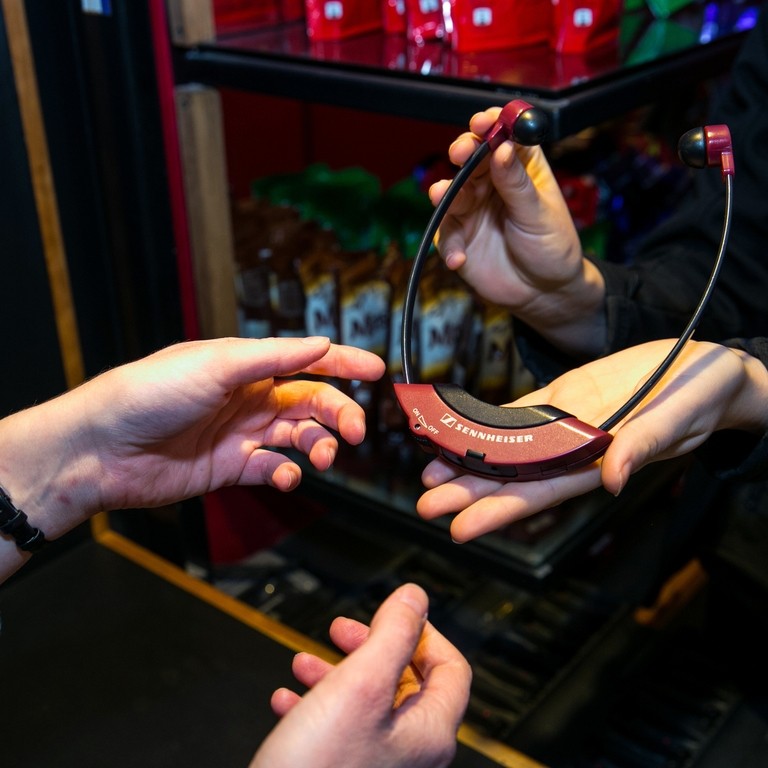
Methods of communication
Offer choice in how your customers communicate with you. Not everyone will be able to speak over the phone or feel comfortable doing so. Similarly, writing an email or filling in a booking form might be difficult for others. Proactively provide several contact methods and details before, during and after a visit. As well as removing the awkwardness from a customer request, this may also encourage the sharing of access requirements and better enable you to provide a welcoming, inclusive experience.
If someone contacts you and tells you that they have an impairment or health condition, ask them if the way you are communicating now suits them and if there is anything you can do to aid communication. For example, someone who is deaf or has hearing loss may welcome knowing that a contact email address is available, or that you’d be happy to have a video call with them. These adaptations may support them to continue their conversation with ease by, for example, lipreading if necessary.
Communication
If you are providing written information to your customers – either online or in-person – concise and clear text is key.
Some hints and tips are provided below:
- Avoid technical terms and be personable where possible. Plain English and active verbs are key.
- Keep sentences short and clear so that they can be accessed by those with varying access requirements.
- Be consistent with terms throughout documentation so that familiarity can be built by the reader. Glossaries and supporting images can also be helpful to aid understanding.
- Use a minimum font size of 12 point and make information available in large print (at least 16 point but ideally 18 point) for partially sighted customers.
- Use plain sans serif fonts such as Arial as these fonts are easier to identify without decorative features.
- Use black text on a white background for the highest contrast.
When communicating face-to-face with customers who have accessibility requirements, it’s important to be clear and purposeful whilst adapting to individual needs:
- Don’t speak too quickly, or patronisingly slowly.
- Introduce yourself at the start of the conversation. Ask your customer two important questions: if they would like assistance, and how you can help.
- Be patient, listen, and ask questions that will enable your customer to tell you what they require. Speak directly to the person requiring assistance, not other customers they may be with.
- And remember, body language gives away a lot so appear calm, warm and professional at all times using gestures to provide context, where needed.
Whether communicating in-person or virtually, some of your customers, particularly those who are deaf or have hearing loss will require interpretation and/or translation services. Take a look at suppliers such as SignVideo and their Video Relay Service (VRS) for businesses, and face-to-face BSL interpretation provided by SignSolutions to find out more.
Case study 3
Tower Bridge
“We have worked with SignVideo to install a video relay interpreting service, so that deaf people can contact us directly prior to their visit. We have also set-up SignVideo’s on-demand video remote interpreter service so that staff members can communicate immediately with a deaf person on-site.
As part of our ongoing accessibility commitment, Tower Bridge continues to provide deaf awareness training to all staff through our well-established partnership with SignVideo, building on two years of successful collaboration.”
Photo by: VisitBritain/George Johnson

Inclusive language
Many people and organisations who see disability as an equality issue prefer the term ‘disabled people’. This is because they think of themselves as people who are disabled by barriers in society and not by their condition. Other people may prefer to use the term ‘person with a disability’, as person-first language resonates with them.
Not everyone with health conditions, impairments and accessibility requirements views themselves as disabled, so won’t relate to disability-focused language. Using terminology rooted in accessibility and inclusion, rather than disability, is a positive way to engage with more customers, regardless of how they identify.
An important caveat to this, however, is that disability-focused language can support your business from an SEO perspective; it is likely that some potential customers may search for ‘wheelchair accessible lodges’ or ‘disabled-friendly hikes’, for example.
The importance of positive language
Avoid using language that suggests having access requirements is a negative thing and encourages pity, such as ‘suffers from’, ‘is a victim of’, ‘handicapped’, ‘invalid’, ‘crippled by’ or ‘wheelchair bound’. This perpetuates harmful stereotypes and suggests that you know how a person feels about their impairment. Some people see it very much as a positive thing that has enhanced their life and therefore are offended by such language. Remember empathy is important, but sympathy shouldn’t be used. Use the table below, taken from Gov.uk, to help you. You may also find this guidance from Scope about using disability inclusive language in the workplace useful.
Examples of positive language
Avoid
Use
(the) handicapped, (the) disabled
disabled (people)
afflicted by, suffers from, victim of
has [name of condition or impairment]
confined to a wheelchair, wheelchair-bound
wheelchair user
mentally handicapped, mentally defective, retarded, subnormal
with a learning disability (singular) with learning disabilities (plural)
cripple, invalid
disabled person
able-bodied
non-disabled
mental patient, insane, mad
person with a mental health condition
deaf and dumb; deaf mute
deaf, user of British Sign Language (BSL), person with hearing loss
the blind
people with visual impairments; blind people; blind and partially sighted people
an epileptic, diabetic, depressive, and so on
person with epilepsy, diabetes, depression or someone who has epilepsy, diabetes, depression
dwarf; midget
someone with restricted growth or short stature
fits, spells, attacks
seizures
Focusing on access requirements
Asking someone to ‘declare’ their impairment can be unhelpful as there may be several reasons why they don’t wish to share this information. A better approach is to ask about any access requirements that someone may have, as it is less intrusive whilst still giving you the information you need. In fact, asking about access requirements often gives you much more useful information; a customer may tell you that their impairment is cerebral palsy, which doesn’t really tell you all that much about what they require and the facilities and/or support you should provide. If you asked about their access requirements, however, they might tell you that they’re a wheelchair user and require accessible parking, toilets and step-free access.
Case study 4
Church Farm Barns
“From the very beginning, we have been driven to ensure that Church Farm Barns is accessible to all. We are aware of the varied needs that many have and how individualised these can be, so we strive to tailor the holidays to each individual to enable them to have a comfortable stay as possible. This begins before they even arrive, with the help of an informative website and a person either on the end of a phone or an email to assist to make everything perfect.”

Asking appropriate questions
If someone tells you that they are disabled, there is no expectation for you to be an expert and know what their access requirements are, as everyone is different. It is perfectly acceptable to ask someone what assistance you can provide. Asking guests at time of booking if they have any accessibility requirements, for example, can help you make any necessary arrangements ahead of their arrival. It will also reassure the guest that you are keen to understand their individual requirements in order to provide a great experience.
Case study 5
Broadgate Farm Cottages
“We try to listen and accept that we can always learn and improve. We are very conscious that a one size fits all solution is not appropriate, particularly as we personally don’t have any direct experience of access requirements linked to impairments such as autism or dementia. We adopt the approach of discussing each guest’s needs with them and then adapting what we have to suit.”

Being open to education
When thinking about language, it’s important to be open to education. The appropriate terminology changes frequently. If a customer corrects your language, resist the temptation to get defensive, and instead listen to alternatives to use in future. However, don’t assume that the language preferred by one disabled person will be representative of what every person likes or resonates with; ask if you’re ever unsure.
Ultimately, using appropriate terminology and communicating confidently with your customers is largely about using common-sense. If you mean well, most of what you say will be taken well by those you talk to, and making a mistake with the best of intentions is better than not trying at all.
Case study 6
Alpacaly Ever After
“Listen to the advice offered by those with experience in the field and any feedback offered by members of communities who you seek to include in your reach. Self-reflect on what you provide, how it is communicated and if there’s anyone who would potentially be excluded. Always aiming to improve by listening and implementing positive change should be the goal.”

Supporting inclusive communication
Not everyone speaks or understands English perfectly, and the way in which you communicate should allow for this. Present material clearly and simply. Avoid words you would never use in everyday speech e.g., use ‘near’ instead of ‘in the vicinity of’.
Use images, pictograms and symbols to help users navigate text, for example a pictogram of a car or bus to indicate transport.
Case study 7
North Hayne Farm Cottages
“We provide an online social story to help prepare our visitors with what to expect when they are on holiday with us. During their stay visual aids and daily planners are available to borrow, which can help children settle more quickly and process the changes to their usual routine. Our social stories are available to every guest who books with us and can help to educate those who do not understand autism as well as help them to develop patience through understanding more about the condition. This allows us to then have a more fully integrated site where everyone feels more relaxed and confident. Since making changes to our marketing and accessibility we have noticed between a 15 to 20% increase in visitors with Autism Spectrum Disorder (ASD) and other non-visible impairments.”

Offering accessible guided tours
If you offer guided tours, ensure they are accessible to all by following the useful guidance and top tips from Tourism Northern Ireland and the T-Guide accredited accessibility training for Tourist Guides.
Providing dedicated accessible sessions and events
Although accessibility should be mainstreamed where possible, providing dedicated accessible sessions or events can help everybody to fully engage with and enjoy the experience. Access events are designed with disabled visitors in mind, and include ‘relaxed’ opening hours and performances, BSL tours, and touch or audio described tours.
Where possible, think about the types of access events you can provide. Relaxed showings are great for cinemas and theatres, which allow visitors to come and go as they please. BSL tours can be a standalone offer for deaf museum and gallery visitors, or one interpretation element of a wider tour. Family-focused exhibitions may be able to adapt activities quite easily in a way that is focused on a different sense, or alternative capability, allowing all family members to get involved, including disabled children. And audio described tours can add a whole new exciting angle to the discovery of objects and artworks for those who are blind or partially sighted, so training staff in this may be particularly useful for cultural institutions.
Whatever access event you decide to provide, do ensure that the availability of well-trained staff to either deliver or support the event or tour is one of your highest priorities. Secondly, it might be worth thinking about what other resources you’ll need to provide to ensure things run smoothly – an accessible booking system and point of contact, a quiet area for decompression, and additional resources such as sensory maps and visual stories are all recommended.
Don’t forget to promote your access events online - how else will new and existing visitors find out about such things and – just as importantly – have the confidence to book? Adding this information to an access-specific webpage on your website is a great way to start: the National Space Centre has a dedicated page for their Accessible Afternoons. For further information, please refer to Section 6: Marketing your Accessibility.
Staff awareness and training
To be able to confidently serve customers with accessibility requirements, you and your staff need to be deaf and disability aware. This training should be provided for all staff on induction and refreshed at regular intervals. Often, it’s useful to provide written or recorded resources in addition to face-to-face training sessions to enable staff members to remind themselves of certain elements at their leisure.
Training providers
There are several online and classroom style disability awareness training courses in addition to those mentioned elsewhere in this toolkit. Please note, the following list contains only a sample of options, and other great training providers are available:
- AbilityNet provides training and webinars focused on digital accessibility.
- AccessAble offers a range of online and face-to-face training courses targeted at all levels within an organisation. Courses aim to support staff to become more confident and comfortable in their engagement with both disabled customers and colleagues.
- Access and Inclusion UK provides disability awareness training focused on creating positive change.
- AccessibleUK provides Accessibility Champion training for businesses.
- Attitude is Everything provide disability-led sessions to culture and heritage and live events venues.
- The Alzheimer’s Society Dementia Friends initiative provides in-person Information Sessions, virtual Information Sessions and short online videos.
- Guide Dogs UK provide free Sighted Guide training, which covers basic guiding techniques.
- Hidden Disabilities Sunflower Scheme has a business network membership that includes training on invisible impairments and the sunflower scheme.
- Enhance the UK provides disability awareness training sessions, deaf awareness training and BSL courses for businesses.
- Kimel Solutions provides training courses related to autism and neurodiversity.
- Mind provide training courses for businesses wanting to better understand mental health and wellbeing.
- The National Autistic Society provides online training bundles related to autistic customers.
- Purple provide free e-learning modules based on disability and customer service.
- RNID provides deaf awareness training for staff members.
- Sargent Group Consulting provide a free one hour online Dementia Tourism Workshop.
- Scope provides Disability in the Workplace training.
- Topp Language Solutions provide Deaf Awareness Training and BSL Training to help build staff confidence to interact and support Deaf visitors.
- Tourism for All provides a suite of online training courses, including a free introductory course.
- Visit Birmingham’s Accessible Tourism Hub provides modules related to accessible tourism, neurodiversity, the Equality Act 2010, inclusive marketing and digital accessibility.
- Visits Unlimited provide bespoke classroom-style training courses in disability awareness for tourism businesses.
- Welcome to Excellence provides a one-day classroom style course called Welcoming all Customers.
- WelcoMe provides in-app accessibility and customer service training to staff.
You can also download non-branded inclusive tourism training slides and accompanying notes from the downloads section of this toolkit, which have been designed to help you provide a basic accessibility awareness training for your staff.
It is also important that staff are familiar with the use and operation of all accessibility equipment such as hearing loops, emergency pull cords in toilets and hoists. Make sure your specialist equipment is regularly tested, always in working order and in good supply.
As part of induction, staff should also be made aware of schemes such as the Hidden Disabilities Sunflower Scheme (and similar initiatives such as the JAM card), so they are equipped to support customers with non-visible impairments if required.
Case study 8
Westfield and Ethos Farm
“Westfield London and Westfield Stratford City have made significant strides in their journey to become recognised as the most accessible shopping destinations in the UK. These advancements have been achieved through a comprehensive series of improvements, developed in collaboration with Ethos Farm, the managers of Westfield London and Stratford City’s Guest Services and Car Park Customer Service teams.
In order to provide support for both adults and children with non-visible impairments, both centres have introduced Westfield Sensory Packs. These packs include ear defenders and sunglasses to assist with noise and light sensitivity, fidget toys to keep hands occupied and alleviate stress, and ‘feeling fans’ to aid in self-expression.
Additionally, both locations have implemented the innovative WelcoMe app - a UK retail first. This app allows guests with accessibility requirements, whether those needs are visible or not, to request additional assistance or simply notify the guest services teams of their presence. WelcoMe also serves as an invaluable educational tool for staff, providing them with essential information to foster a deeper understanding of various conditions and how to deliver the best possible service to all guests.”
Photo by: Ian Georgeson Photography

Case study 9
Hull Truck Theatre
The continued development of staff is extremely important to Hull Truck Theatre (HTT). Our aim is to be as inclusive as possible to everyone and being able to better understand different needs and expectations will allow us to do that. HTT staff have undergone various training sessions so that we are armed with the knowledge to be able to support our customers – for example, disability awareness, sighted guide training, basic BSL and Deaf awareness, training around neurodivergence, LGBTQ+ and Trans awareness training. And we pride ourselves on our warm and inclusive welcome. A challenge for us now is to ensure that we take all colleagues with us on our inclusivity and access journey. Whilst there are specific departments (i.e. Front of House and Box Office staff) that encounter customers directly, the whole company needs to be part of the journey and understand our aims and objectives.
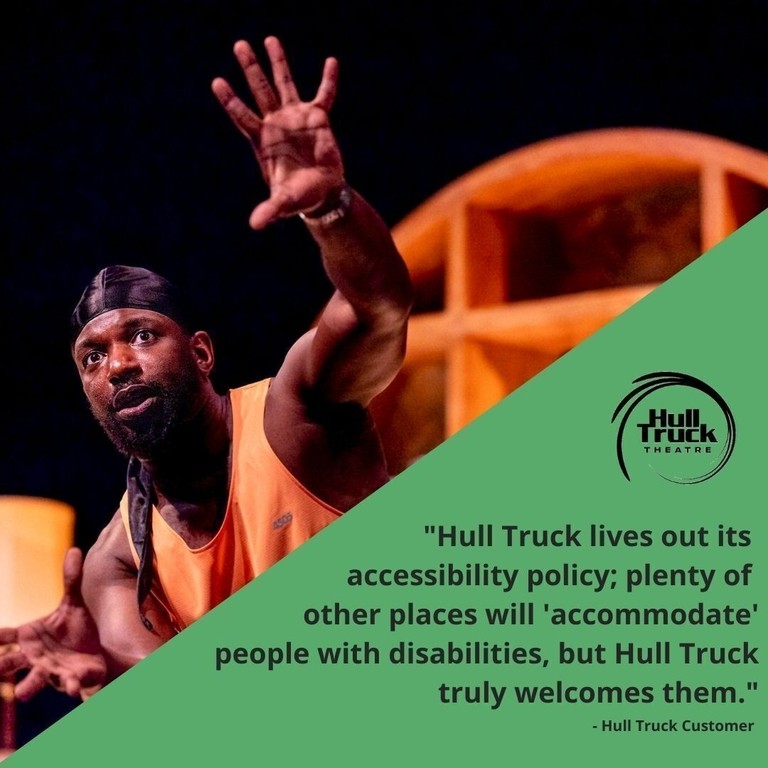
Something to consider
A moment for reflection
After reading this section, write down three new ways in which you are going to ensure an inclusive welcome for your customers with accessibility requirements.


